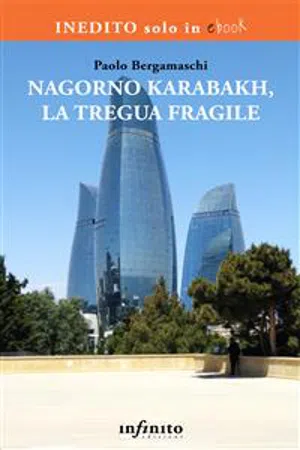
- English
- ePUB (mobile friendly)
- Available on iOS & Android
Nagorno Karabakh, la tregua fragile
About this book
Dal 1994 il 20 per cento dell'Azerbaigian è, di fatto, sotto il controllo delle forze armate dell'Armenia. In quell'anno fu negoziato il cessate-il-fuoco che congelò il conflitto (1992-1994) fra i separatisti armeni del Nagorno-Karabakh sostenuti dai soldati armeni e l'esercito di Baku. Con il Nagorno-Karabakh, regione autonoma a maggioranza armena in territorio azero, gli armeni occuparono anche sette province circostanti popolate quasi esclusivamente da comunità di etnia azera. Per Baku si è trattato di una catastrofe nazionale, una ferita profonda e lancinante che non si è mai rimarginata. Furono 30.000 i morti e 900.000 gli sfollati costretti ad abbandonare in fretta a furia abitazioni e proprietà per rifugiarsi a est, verso zone più sicure. Da allora poco o nulla è cambiato. All'Organizzazione per la Sicurezza e la Cooperazione in Europa (Osce) fu affidato il compito di trovare una soluzione di compromesso fra le parti che portasse a un accordo di pace definitivo. Aria fritta utile solo a creare posti di lavoro per la diplomazia internazionale. Le feluche di Russia, Stati Uniti e Francia, i tre Paesi designati a guidare i negoziati, fanno regolarmente la spola fra Erevan e Baku senza cavare un ragno dal buco. Tutto rimane come prima. La guerra è finita ma la pace non è mai cominciata. Nonostante l'accordo del 1994, il fuoco non è mai cessato sulla linea che separa le parti. Il tiro incrociato dei cecchini armeni e azeri rompe periodicamente il silenzio e le vittime sono spesso civili inermi che ostinatamente rifiutano di abbandonare i luoghi di origine.
Frequently asked questions
- Essential is ideal for learners and professionals who enjoy exploring a wide range of subjects. Access the Essential Library with 800,000+ trusted titles and best-sellers across business, personal growth, and the humanities. Includes unlimited reading time and Standard Read Aloud voice.
- Complete: Perfect for advanced learners and researchers needing full, unrestricted access. Unlock 1.4M+ books across hundreds of subjects, including academic and specialized titles. The Complete Plan also includes advanced features like Premium Read Aloud and Research Assistant.
Please note we cannot support devices running on iOS 13 and Android 7 or earlier. Learn more about using the app.
Information
Table of contents
- Copertina
- Nagorno Karabakh, la tregua fragile
- Indice dei contenuti
- Nagorno Karabakh, la tregua fragile